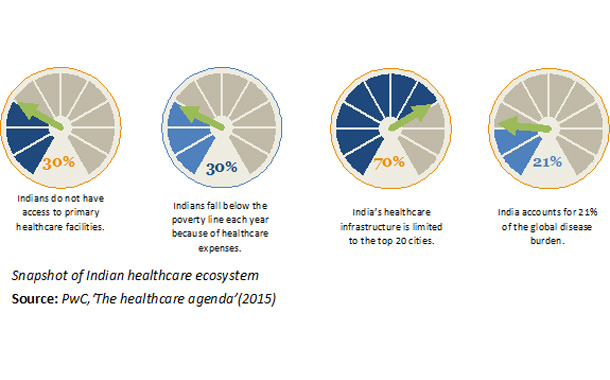In India, there is considerable potential to leverage mHealth (mobile health) as an alternative healthcare delivery channel. According to the knowledge paper titled “How mHealth can revolutionize the Indian healthcare industry,” jointly launched by PwC and the Confederation of Indian Industries (CII) at the 14th India Health Summit, access to even basic healthcare is a challenge because the supporting infrastructure and resources are inadequate. India has only 0.7 Doctors, 1.3 Nurses and 1.1. Hospital beds per 1000 population thus creating a need for alternative channel like mHealth for delivery of healthcare.Additionally, there are some worrying statistics on the Indian healthcare ecosystem. In fact, a large segment of the population is deprived of even primary healthcare facilities. It is imperative to leverage newer ways to make quality and affordable healthcare accessible to everyone.
The knowledge paper focuses on the factors driving healthcare providers and patients to adopt mHealth. Financial constraints like rising healthcare costs and limited budget allocation for healthcare by the government further constrain the healthcare ecosystem in India. Behavioral factors such as change in lifestyle have resulted in newer types of diseases which require access to specialists who are few in number and cannot be reached through traditional means of healthcare delivery.
Commenting on this trend, Dr. Rana Mehta, Partner & Leader – Healthcare, PwC India said, “If mHealth is adopted completely in India, it has the potential to play a critical role in improving the healthcare outcome for the country. We can expect that through mHealth, an additional 12-14% of the population will gain access to healthcare. India’s population is around 1.3 billion and if we take a conservative estimate of 6-8%, we can expect to provide access to healthcare to an additional 79 to 105 million people.”
Dr Naresh Trehan, Chairman, CII Healthcare Council said, “India needs newer and innovative ways to provide care and compensate for the shortage of healthcare workforce and infrastructure. A reduction of 15-20% in patient’s healthcare cost is possible through mHealth enabled treatment and remote monitoring thus resulting in savings of $ 0.8 to 1 billion.”
The knowledge paper highlights that there are a number of features in mobile that can be leveraged to capture and transfer data.
The evolution of mobile technology has opened newer and better ways to provide care. In India, there has been successful implementation of Text/SMS, Tele and Video consultations. Slowly and steadily, Indian healthcare community has also been leveraging mobile technology for data capture and data sharing. It is time for the healthcare ecosystem to explore various mHealth apps, device integration and sensor technology seriously and start benefitting from it. There is huge untapped potential of mHealth through these technologies that Indian healthcare can benefit from. The future advancements will surely enable further ways of providing care by leveraging mHealth.


